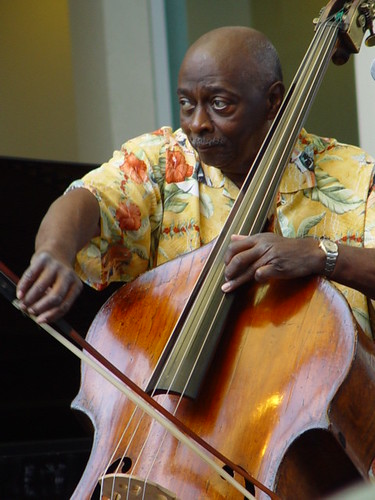 Jazz bassist Eric Hochberg sent me this obituary over the weekend for the great Art Davis, a musician who not only worked with John Coltrane, Duke Ellington, and Thelonious Monk but also with the New York Philharmonic and NBC and CBS Orchestras as well as earning a doctorate in clinical psychology.
Jazz bassist Eric Hochberg sent me this obituary over the weekend for the great Art Davis, a musician who not only worked with John Coltrane, Duke Ellington, and Thelonious Monk but also with the New York Philharmonic and NBC and CBS Orchestras as well as earning a doctorate in clinical psychology.
You can visit the Art Davis website to learn more about this great artist.
__________
Double bassist Art Davis, who played with jazz greats, dies at 73 The Associated Press Published: August 4, 2007
LONG BEACH, California: Art Davis, the renowned double bassist who played with John Coltrane and other jazz greats, has died. He was 73.
Davis died of a heart attack Sunday at his home in Long Beach, his son Kimaili Davis told the Los Angeles Times.
Davis was blacklisted in the 1970s for speaking up about racism in the music industry, and then later earned a doctorate in clinical psychology and balanced performance dates with appointments to see patients.
“He was adventurous with his approach to playing music,” said pianist Nate Morgan, who played with the elder Davis intermittently over the past 10 years. “It takes a certain amount of integrity to step outside the box and say, ‘I like it here and I’m going to hang here for a while.'”
Known for his stunning and complete mastery of the instrument, Davis was able to jump between genres. He played classical music with the New York Philharmonic, was a member of the NBC, Westinghouse and CBS orchestras, and played for Broadway shows.
The most enriching experience of his career was collaborating with John Coltrane. Described by jazz critic Nat Hentoff as Coltrane’s favorite bassist, Davis performed on the saxophonist’s albums including “Ascension,” Volumes 1 and 2 of “The Africa/Brass Sessions” and “Ole Coltrane.”
The two musicians met one night in the late 1950s at Small’s Paradise, a jazz club in Harlem.
Davis viewed his instrument as “the backbone of the band,” one that should “inspire the group by proposing harmonic information with a certain sound quality and rhythmic impulses,” Davis said in an excerpt from So What magazine posted on his Web site.
By following his own advice, Davis’ career flourished. He played with a long and varied list of artists: Thelonious Monk, Duke Ellington, Rahsaan Roland Kirk, Louis Armstrong, Judy Garland, John Denver, the trio Peter, Paul and Mary and Bob Dylan.
Davis began studying piano at age 5 in Harrisburg, Pennsylvania, where he was born in 1933. By sixth grade Davis studied the tuba in school because it was the only instrument available, he said.
By 1951 he decided to make music his career. He chose the double bass, believing it would allow more opportunities to make a living. At age 17 he studied with the principal double bassist at the Philadelphia Orchestra. But when he auditioned for his hometown’s symphony, the audition committee was so unduly harsh and demanding that the conductor Edwin MacArthur questioned their objectivity.
“The answer was, ‘Well, he’s colored,’ and there was silence,” Davis recalled in a 2002 article in Double Bassist magazine. “Finally MacArthur burst out, ‘If you don’t want him, then you don’t want me.’ So they quickly got together and accepted me.”
After high school, Davis studied classical music on scholarship at the Manhattan School of Music and the Juilliard School of Music. At night he played jazz in New York clubs.
In the 1970s, his fortunes waned after he filed an unsuccessful discrimination lawsuit against the New York Philharmonic. Like other black musicians who challenged job hiring practices, he lost work and industry connections.
With less work coming his way, Davis returned to school and in 1981 earned a doctorate in clinical psychology from New York University. For many years he was a practicing psychologist while also working as a musician.
As a result of his lawsuit and protest, Davis played a key role in the increased use of the so-called blind audition, in which musicians are heard but not seen by those evaluating them, Hentoff said.
The accomplished musician also pioneered a fingering technique for the bass and wrote “The Arthur Davis System for Double Bass.”
Besides his son Kimaili, Davis is survived by another son and a daughter.
Bass News Right To Your Inbox!
Subscribe to get our weekly newsletter covering the double bass world.

I owe Mr Davis a great deal. From 1974 to 1976, Mr Davis was my teacher. He taught me so well that I auditioned and was accepted into music school. But he taught me so much more about self-respect and earning one’s place in this world. While this posting is way over due, I hope Kamaili, your brother or your sister read this and know that your father left a big mark on me. I think of him every day and the world has lost not only a great bassist, but really good man and mentor. Peace –